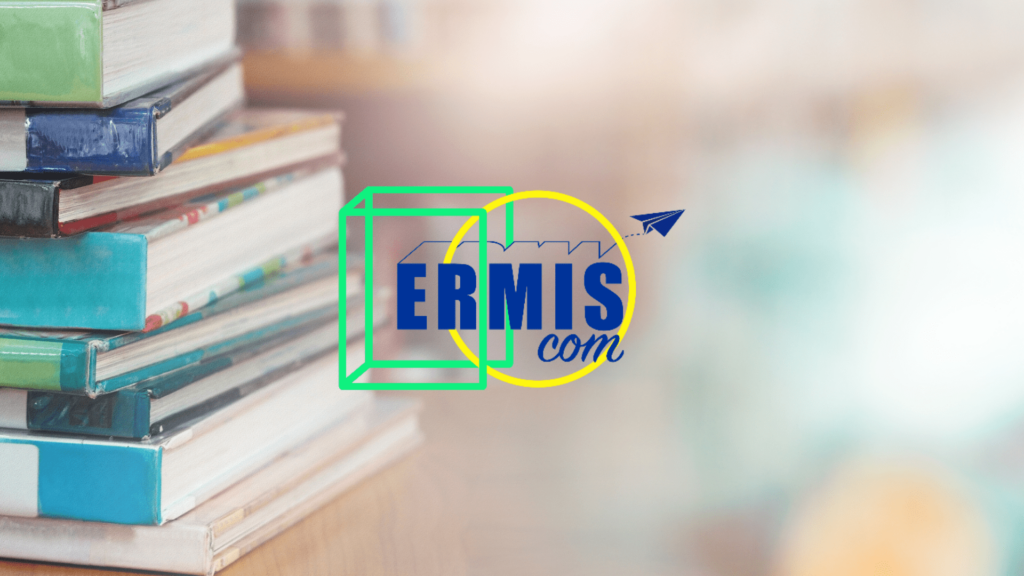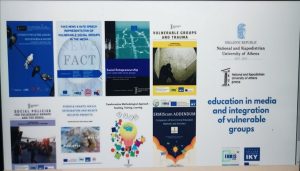
ERMIScom e-BOOKS are now available!
ERMIScom, an Erasmus+ project promoting Education in Media and Integration of Vulnerable Groups
In our rapidly evolving and increasingly intricate globalized world, it is more crucial than ever to take decisive actions that prevent discrimination, ensure equal access to goods and services for all individuals, and cultivate a truly inclusive society that upholds the human rights of vulnerable groups. These endeavors are essential to promote fairness, justice, and harmony among diverse populations.
To address these pressing challenges, the Erasmus+ European program has provided funding and support for the development of educational materials under the ERMIScom project, specifically focusing on “Common curricula for diversity: education in media and integration of vulnerable groups”. These materials have been presented as the eighth Intellectual Output, utilizing an engaging Power Point format that showcases the culmination of this endeavor—a collection of seven digital books.
The creation of these educational resources has been a collaborative effort, bringing together distinguished scientists, professors, and researchers from various higher education institutions involved in the university partnership project. These esteemed institutions include Bahçeşehir University in Turkey, Metropolia Ammattikorkeakoulu in Finland, the University of National and World Economy in Bulgaria, Vrije Universiteit Brussel in Belgium, and the NGO E.K.O. in Greece. The authors of the seven e-books, now available online to anyone interested, hail from diverse fields of expertise, each contributing their unique perspectives and insights on critical topics such as discrimination, stereotypes, prejudices, fake news, hate speech, European social policy actions, research, application of social entrepreneurship, and innovative teaching and learning methods for students and teachers. Through their collective work, they aim to encourage critical thinking and promote a holistic understanding of these subjects.
In addition to the digital books, the ERMIScom project has also developed a valuable complementary resource known as the ERMIScom Addendum. This Addendum represents a horizontal deliverable, aligning with the consortium’s objective of incorporating innovative teaching practices and non-formal education methods into the new curriculum. It serves as a compilation of 60 activities, designed based on the principles of non-formal education. This resource transcends the boundaries of formal education settings and extends its utility to non-formal education workshops and other learning activities. As a result, the ERMIScom Addendum becomes an invaluable asset for students, educators, and media professionals alike, providing them with a rich source of ideas, strategies, and approaches to foster inclusive learning environments and promote diversity awareness.
In summary, in our dynamic and interconnected world, the need to combat discrimination, ensure equal access, and create an inclusive society is of paramount importance. The ERMIScom project, supported by the Erasmus+ European program, has produced educational materials and a complementary resource—the ERMIScom Addendum—that empower individuals to think critically, embrace diversity, and contribute to the realization of a more equitable and inclusive future.
The e-books and the Addendum are each assigned a unique title and International Standard Book Number (ISBN) for identification purposes. The titles and ISBNs for each of these resources are listed below:
- – IO5 BOOK: INTEGRATION POLICIES FOR VULNERABLE SOCIAL GROUPS AND THE MEDIA (ISBN 978-960-466-308-8)

Source: IO8_ ppt presentation of the seven E-Books and the Addendum
The educational material created within the framework of the ERMIScom project serves a dual purpose. Primarily, it is designed for students and teachers who may participate in a prospective Erasmus Mundus master’s program, which could be developed in collaboration with the partnering universities. This material is tailored to cater to the specific needs and interests of these individuals, offering them valuable insights and resources to enhance their learning experience.
However, the significance of this educational material extends beyond the confines of a single program. The topics covered in the material are inherently interdisciplinary, encompassing a wide range of subjects. As a result, they have relevance and applicability to numerous other educational programs and disciplines. For instance, the material focuses on media literacy training, equipping learners with the necessary skills to critically analyze and navigate the media landscape. It also delves into various means and techniques employed by communication studies professionals to present information in a compelling and engaging manner.
By addressing these broader themes, the educational material becomes a rich source of knowledge and information for individuals pursuing diverse fields of study. Whether it be students and educators in related academic programs, professionals in the communication industry, or individuals interested in gaining a deeper understanding of media literacy, the material offers valuable insights and resources to a wide audience.
Within the framework of ERMIScom, several complementary activities were implemented to foster collaboration among the project partners and further strengthen the consortium. These activities played a crucial role in maximizing the collective expertise and resources of the participating universities and organizations. The following activities were undertaken as part of this collaborative effort:
- – Three Transnational Partner Meetings (two in ATHENS, GREECE and one in SOFIA, BULGARIA) for setting common specific milestones, monitor the progress of the project`s deliverables and evaluate and optimize management parameters.
- – Two Learning, Teaching, Training Activities (LTTs), and in particular: (a) a 9-day Intensive program for Higher Eucation Learners “Media Education for Diversity” in ISTANBUL, TURKEY, which was the first opportunity during the project’s life-cycle to test all IOs in a joint manner, simulating the whole master curriculum in an intensive & interdisciplinary way and (b) A 7-day Blended Mobility for Higher Education Students “Applying New Methodologies in Media Education for Diversity” in HELSINKI, FINLAND, which equipped participants with digital skills & competences with new media & interactive journalism tools, and gave the opportunity to review the modules after the piloting period.
- – Three Multiplier Events: A Mid-Term and Final Conference, in ATHENS, GREECE, and a Cross-Interaction Event among policymakers, academia, media professionals, civil society and vulnerable social groups in BRUSSELS, BELGIUM
The coordination of the ERMIScom project was entrusted to the esteemed Communication and Media Studies department of the National Kapodistrian University of Athens. Under their guidance and leadership, the project successfully came to fruition, resulting in the creation of seven e-books and a Companion of Non-Formal Education Methods and Activities.
These valuable resources, which encapsulate a wealth of knowledge and insights, have been made accessible to the public through the dedicated project website: ermis.com.uoa.gr. The website serves as a repository for these materials, allowing individuals from around the world to access and benefit from the educational content developed as part of ERMIScom.
A heartfelt appreciation is extended to the authors who contributed their expertise, research, and experiences to the creation of the e-books and the Companion. Their dedication and valuable insights have enriched the educational material, making it a comprehensive and enlightening resource.
Furthermore, recognition is owed to the coordinators of the e-books, who played a pivotal role in ensuring the seamless compilation and organization of the content. Their meticulous efforts have contributed to the overall quality and coherence of the educational material.
Gratitude is also expressed to the scientific and administrative staff of the participating universities, whose unwavering support and commitment have been instrumental in the successful implementation of the ERMIScom project. Their collaboration and collective efforts have laid the foundation for the project’s achievements.
Last but not least, special thanks are extended to the Greek National Agency for the Erasmus+ programme, as well as their dedicated staff. Their financial support and continuous assistance throughout the project’s execution have been invaluable, enabling the realization of ERMIScom’s goals and objectives.
Together, the coordination team, authors, coordinators, university staff, and the Greek National Agency have played significant roles in bringing the ERMIScom project to life, fostering inclusive education, and promoting diversity awareness through the dissemination of high-quality educational materials.